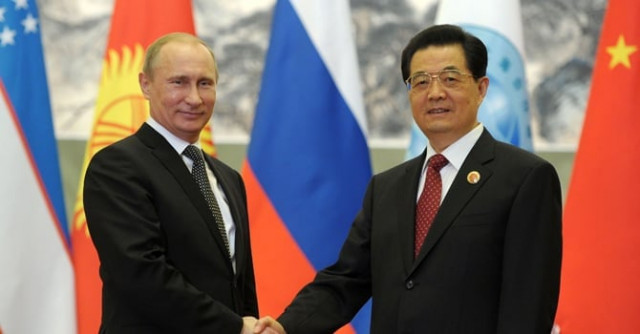Divisions stalk China-Russia unity: Analysts
Allies share mutual interests, solve problems. China and Russia do not share that relationship: Russian newspaper.

The two countries' leaders used a regional summit in Beijing this week to put on a very public display of solidarity over the Syrian conflict, which has placed them at loggerheads with Western powers, and Iran's nuclear drive.
But Beijing and Moscow have long had an uneasy relationship dating from when each jostled to dominate the communist world, and analysts say their closeness now marks a marriage of convenience as they look to counter Western influence.
"Both Beijing and Moscow are become increasingly negative about the United States and Europe," said Jonathan Holslag, head of research of the Brussels Institute of Contemporary China Studies.
"The West has elicited the increasing anger of Moscow on a number of issues, ranging from missile defence, the modernization of tactical nuclear weapons, to the intervention in Libya.
"Beijing sees its interaction with the US souring on maritime security and trade. It's aversion to the West that drives them closer."
Russian President Vladimir Putin, in Beijing after pointedly cancelling a trip to the United States, told Chinese counterpart Hu Jintao this week their interests "align perfectly in a great many areas, including in cooperating on the world stage".
Hu said a vow to bolster cooperation in the United Nations -- where veto holders China and Russia face pressure to act against Syria -- would allow them to "set the global political and economic order in a more fair and rational direction".
The United States has been a leading voice in pressuring Russia and China to do more on Syria -- an ally of both states.
"Both China and Russia want to send a message to other greater powers, particularly the United States -- 'don't push me too hard'," said Zheng Yongnian, politics professor at the National University of Singapore.
China and Russia declared they were "decisively against" intervention or regime change in Syria -- where a bloody uprising has lasted 15 months -- and opposed the use of force over Iran's nuclear ambitions.
The display of unity also results from unease over a US decision to focus more on the Asia-Pacific. Washington announced last week that it would base 60 percent of its naval forces in the region by 2020.
"China and Russia seem to be coming under a lot of pressure from the United States, which is pulling out of Afghanistan and Iraq and putting more resources in the Asia-Pacific," said Willy Lam, professor at the Chinese University of Hong Kong.
"So there is a need to display a common front... But China and Russia also have mutual suspicion -- both are giants in the same region of the world, so they also see themselves as long-term strategic competitors," he told AFP.
Jean-Pierre Cabestan, politics professor at Hong Kong Baptist University, pointed out that the two countries displayed a common strategy "on issues that for them are quite easy".
"But there are lots of issues that divide them... particularly oil and gas prices and the completion of pipelines," he said.
The two sides, for instance, have for years failed to sign off on a huge natural gas deal that could see Russia supply 70 billion cubic metres of gas a year directly to China, due to pricing disagreements.
Lam said another indication of their "mutual suspicion" was a marked fall in China's purchases of Russian weapons over the years.
China's "PLA (People's Liberation Army) is quite unhappy about the fact the Russians refuse to sell them the most sophisticated type of weapons", he explained.
Beyond a strategic keenness to counter US pressure, analysts say the two countries have an interest in cooperating on economic grounds. Energy-hungry China needs oil and gas from Russia, which in turn needs Chinese consumer goods and investment.
But there is scepticism that the relationship amounts to anything greater than political and economic expedience.
"What makes us and China truly like-minded besides a (common) stance on Syria and hostility towards the USA?" said an editorial in Russia's liberal newspaper Vedomosti on Thursday.
"Allies are the countries which while pursuing their policies take into account each other's interests, and if an ally is having problems they interfere to solve them," it said.
"There is and will be nothing of this kind between Russia and China. Not that Russia would not want it. It's just that China does not enter any truly binding alliances with anyone."



















COMMENTS
Comments are moderated and generally will be posted if they are on-topic and not abusive.
For more information, please see our Comments FAQ